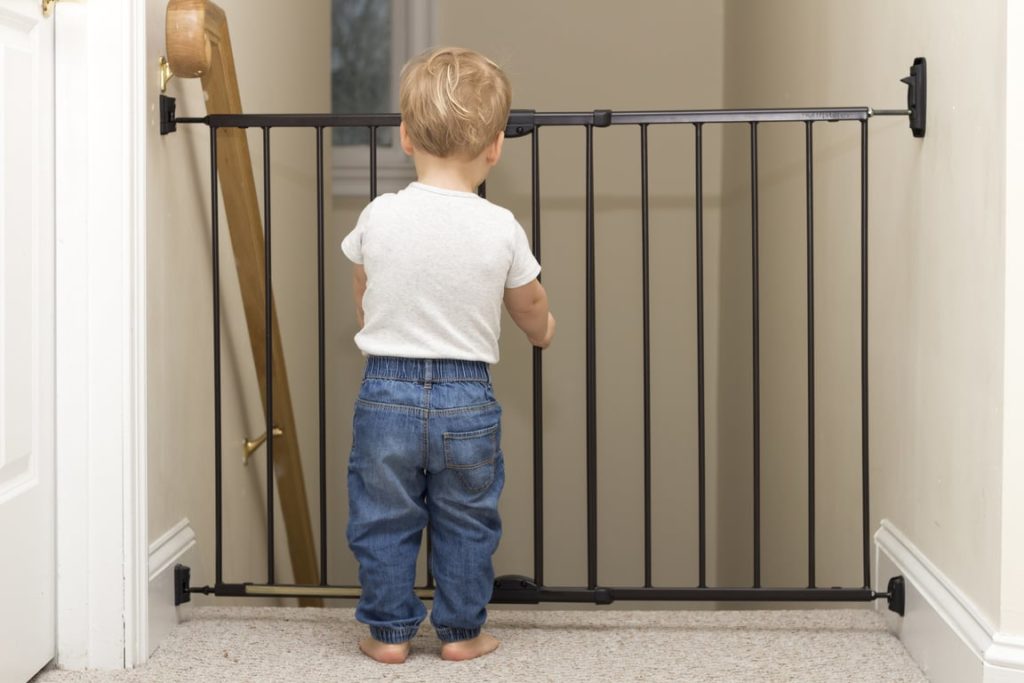As any parent will tell you, young kids have a knack for ending up with bumps and bruises while playing around the home. While most kids walk away with a bruise or a goose egg on their forehead, some household dangers are worse than others. So-called “playground injuries” like falls or joint pain are among the top reasons why kids visit emergency rooms each year, which is why it’s crucial to minimize safety risks at home.
From working with a residential locksmith to checking your fire detectors, there are plenty of things parents can do to keep kids safe indoors. It even helps to secure hazardous items and substances, which is where safe locksmiths can help as well.
If you’re hoping to reduce childhood injury risks from dangers both inside and outside of your home, here are a few tactics worth trying.
Prevent Accidental Falls
For young kids, preventing accidental falls can be crucial if you want to keep serious injuries at bay.
This includes simple tactics like using a child-proof gate to limit their access to the stairs or placing a non-skid mat in the bathtub. If you have a pool, make sure to lock any gates that surround it. You’ll also want to secure heavy furniture: young kids have a knack for climbing things, and the last thing you want is for them to fall with the furniture on top of them.
Because it’s difficult to prevent all accidental falls, consider using corner guards on any furniture with sharp edges. This can make injuries less common as your kids play.
Work With a Residential Locksmith
Maintaining or replacing home locks is the best way to keep your kids safe from dangers outside the house. Consider reaching out to a residential locksmith for help with things like re-keying your home or switching to a keypad lock. Choosing a locksmith with experience in a range of locking mechanisms can help you find the right options for your home.
In addition to placing locks on your doors, consider putting child safety locks on your windows as well. You can ask your local locksmith for recommendations or order some online.
If you’re concerned that your child might be tall enough to reach your oven or stove, secure these areas as well. Child-proof oven locks are easy to find online, and you can also find stove guards and covers that help keep switches and knobs off-limits to young kids.
Secure Any Weapons
Though replacing home locks can keep kids safe from outdoor threats, weapons can still put them in danger indoors.
The ideal environment for children is gun-free, which negates any risk of an accidental shooting. If you do own a gun, make sure to keep it unloaded and locked up. This is true no matter how old your children are.
In addition, knives and other sharp objects should always be out of young kids’ reach. This is true for both kitchen knives as well as pocket or hunting knives.
If you want to store your gun or other weapons in a safe, a locksmith may be able to recommend good options for purchase.
Check Your Detectors
In addition to minimizing childhood injury risks, don’t forget to check your home’s various detectors.
You should check the batteries on your smoke detectors at least once a month. Note that young kids respond better to voiced alarms rather than alarms that only use high-pitched tones. This is true even when kids need to self-rescue.
Last, make sure you install and maintain a carbon monoxide detector in your home as well. This is especially crucial in the winter months when your heater is running.
Keep Poisonous Solutions Locked Up
Depending on your child’s age, you may need to keep various poisonous solutions locked up. Here are things you may want to secure:
- Cleaning solutions
- Batteries
- Medications
- Lawn and garden chemicals
- Bug sprays and deterrents
- Rat poisons
- Laundry detergent
- Alcohol
In general, if a child isn’t old enough to understand the dangers of these items, the items should be locked away.
Consider a Home Security System
A home security system can offer great peace of mind. In addition to protecting homes from burglars, these alarms can also contact the authorities in the case of a fire or a threat when no one at home responds to a call.
If your kids are old enough to stay home alone, make sure they understand how to use and disarm the home security system as needed.
Practice Electrical Safety
Electricity is an invisible danger in the home, especially for young children. Make sure you’re using tamper-resistant outlets that kids can’t jam things into as well as surge protector covers.
Store small electrical appliances out of your kids’ reach. You should also be extra careful when using electrical devices like flat irons and heaters in the bathroom. Never leave these devices plugged in if you plan to walk away from them.
Educate Your Kids on Safety
Last, but not least, educate your kids on safety. As they grow older, your kids will become better equipped to understand the hazards around them. Explain these dangers while reassuring them that they are safe.
Your children should know what to do if there’s a fire, how to call 911, and where things like flashlights or the first-aid kit are. Make sure to write a list of emergency contacts they can call if they’re ever unsure what to do when you aren’t around.
They should also know more than what not to do: it’s helpful to teach them why they shouldn’t do things. Leaving the door unlocked or the alarm system disarmed, for example, isn’t great for protecting homes from burglars.
Talk to a Residential and Safe Locksmith
As you work to secure your children’s safety, don’t hesitate to reach out to a residential locksmith for help. Residential and safe locksmiths make it easy to safeguard your property’s doors and windows to keep dangers at bay.
Choosing a locksmith with a history of reliable and expert service just got easier with Lucky Locksmith. We’re proud to serve customers throughout the St. Louis and Kansas City areas, and we ensure 100% customer satisfaction on every project. Contact us today to learn how we can help.

